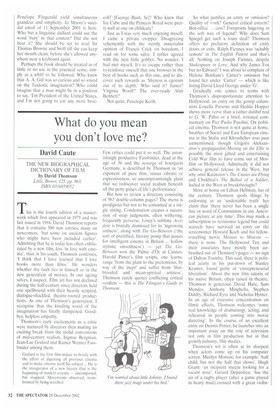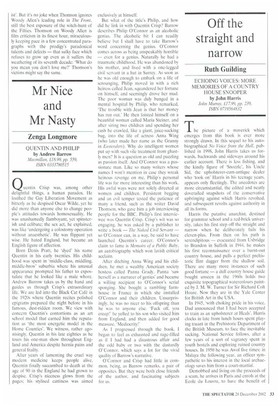What do you mean you don't love me?
David Caute
THE NEW BIOGRAPHICAL DICTIONARY OF FILM by David Thomson Little, Brown, £25. pp. 963, ISBN 0316859052 This is the fourth edition of a masterwork which first appeared in 1975 and was last issued in 1994. David Thomson reports that it contains 300 new entries, many on newcomers, 'but some on ancient figures who might have been included earlier'. Admitting that he is today less often exhilarated by a new film, less 'in love with cinema', than in his youth, Thomson confesses, 'I think that I have learned that I love books more than films.' He wonders whether the fault lies in himself or in the new generation of movies. In our ageing selves. I suspect. Film art has not declined during the half-century since directors held one spellbound with their heavily scripted, dialogue-shackled, theatre-rooted productions. As one of Thomson's generation, 1 recognise that the kindling wood of the imagination has fatally dampened. Goodbye, helpless empathy.
Thomson's early excitements as a critic were nurtured by directors then making an exciting break from the stolid conventions of mid-century realism, Ingmar Bergman, Jean-Luc Godard and Rainer Werner Fassbinder among them:
Godard is the first film-maker to bristle with the effort of digesting all previous cinema and to make cinema itself his subject ... He is the inaugurator of a new beauty that is the beginning of modern cinema — uncomposed, but snapped. Movements observed. transformed by being watched.
Few critics could put it so well. The astonishingly productive Fassbinder, dead at the age of 36 and the scourge of bourgeois Germany, is described by Thomson as 'an exponent of pure film, minus vibrato or expressiveness, so uncompromisingly plain that we rediscover social realism beneath all the petty guises of life's performance'.
But how to review a directory consisting of 963 double-column pages? The menu is prodigious but not to be consumed at a single sitting. Condensation creates a succession of snap judgments, often withering, frequently perverse. Losey's sublime Accident is brutally dismissed for its 'ingrowing artiness', along with The Go-Between ('the sort of prettified, literary pomp that passes for intelligent cinema in Britain ... hollow stylistic smoothness') — yet The GoBetween won the PaIme d'Or at Cannes. Harold Pinter's film scripts, one learns, range 'from the plain to the pretentious, by way of the inept' and suffer from 'thinblooded and mean-spirited artiness'. Thomson rarely quotes conflicting critical verdicts — this is The Filmgoer's Guide to Thomson.
So what justifies an entry or omission? Quality of work? General critical esteem? Box-office ..,_cess? Footprints lingering in the soft wax of legend? Why does Sam Spiegel get such a lousy deal? Thomson offers no prefatory definition of entry doors or exits. Ralph Fiennes was 'suitably remote' in The English Patient and that's all. Nothing on Joseph Fiennes, despite Shakespeare in Love. And why James Fox but no Edward? I was about to complain of Helena Bonham's Carter's omission but found her under 'Carter' — which is like listing David Lloyd George under 'G'.
Gradually one comes to terms with Thomson's disproportionate attention to Hollywood: an entry on the gossip columnists Louella Parsons and Hedda Hopper shows more verve than a rather dutiful nod to G. W. Pabst or a brief, irritated commentary on Pier Paolo Pasolini. On political cinema, Thomson is not quite at home. Swathes of Soviet and East European cinema in the Stalin and Khrushchev eras pass unmentioned, though Grigorii Aleksandrov's propagandist Meeting on the Elbe is possibly the most gifted and entertaining Cold War film to have come out of Mosfilm or Hollywood. Admittedly it did not achieve general release in the West, but why omit Kalatozov's The Cranes are Flying and Chukhrai's The Ballad of a Soldier, hailed in the West as breakthroughs?
More at home on Lillian Hellman, liar of the century, Thomson spoils things by endorsing as an 'undeniable truth' her claim that 'there never has been a single line or word of Communism in any American picture at any time'. This may mark a subscription to revisionist legend but could scarcely have survived an entry on the screenwriter Howard Koch and his fellowtravelling movie Mission to Moscow — there is none. The Hollywood Ten and their associates have mostly been airbrushed out of Thomson's pages — no sign of Dalton Trumbo. This said, there is political acuity in his put-down of Stanley Kramer, found guilty of 'entrepreneurial liberalism'. About the new film talents of his native Britain, often raised in theatre, Thomson is generous: David Hare, Sam Mendes, Anthony Minghella, Stephen Daldry, Richard Eyre and Nicholas Hytner. In an age of excessive concentration on filmic effects, Thomson welcomes 'some real knowledge of dramaturgy, acting, and rehearsal in people coming into movie directing'. In the course of an excellent entry on Dennis Potter, he launches into an important essay on the role of television not only in film production but in that growth industry, film studies.
Thomson's wit is often at its sharpest when actors come up on his computer screen. Marilyn Monroe, for example: 'half child, but not the half that shows'. Hugh Grant: 'an incipient sneeze looking for a vacant nose'. Gerard Depardieu: 'has the air of a rugby player (after a game played in heavy mud) crossed with a great violin ist'. But it's no joke when Thomson ignores Woody Allen's leading role in The Front, still the best exposure of the witch-hunt of the Fifties. Thomson on Woody Allen is film criticism in its finest hour, miraculously keeping pace in a few concentrated paragraphs with the prodigy's paradoxical talents and defects — that sulky face which refuses to grow up even as it suffers the weathering of its seventh decade: 'What do you mean you don't love me?' Thomson's victims might say the same.



























































 Previous page
Previous page